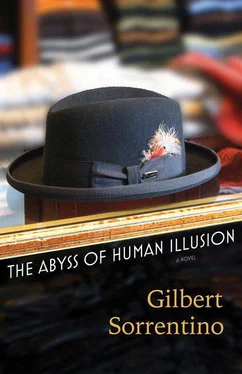Satan’s evil literature was burned at a ceremony conducted by the White-Robed Ladies of the choir of the Lamb’s Blood Ministries, Inc., Church, in the parking lot, to cries of “Amen!” “Jesus!” and “Yes!” wails of joy, and the loud clashing of tambourines. The purification ceremony was followed by a buffet luncheon in the church’s basement, where the pastor, Ellsworth Roy Womp, noticed how her White Robe flattered Myrna’s figure.
He is driving his father’s Fleetwood sedan to the latter’s house, which is near a beach that he somewhat imprecisely recalls. He is driving because his father, while he seems to be strong and alert, is an old man who has had some minor road accidents of late, “moving violations,” as they are officially called. But when he stops to get gas, his father, without a word, gets behind the wheel and takes over the driving.
After traveling perhaps ten or twelve miles, his father turns the Cadillac off the highway into a sparsely wooded area from which a faint dirt road leads into scrub woods and dry grass. His father, without hesitation, takes this road, and suddenly accelerates, so that they are traveling at high speed. He has the idea, which comes to him calmly, that his father wants to kill both of them and he understands why, but says nothing. His father is smiling, pleased and smug and oddly youthful in manner and appearance.
The car bursts out of the woods and the dirt road suddenly becomes a well-paved one, smooth and straight. It appears to be the main street of a small, falsely picturesque seaside town, quaint shops and art galleries seemingly everywhere. Yet on their right is a carton-like building made of gray concrete slabs, some ten stories tall, and in the final stages of construction. On a sixth-story scaffolding, a construction worker is performing oral sex on what seems to be a businessman, who bites the handle of his briefcase in sexual pleasure. The building, in its fierce ugliness, is wholly out of place in the cutely fake little town. A sign near the outdoor freight elevator reads NEPTUNES BAYE ESTATES. His father ignores the building and remarks that this is a very nice town, clean and quiet and right on the water, even though the people who live here are for the most part disgusting fanatic Christians who believe that God speaks to them. At the end of the street lies a glistening stretch of what looks to be a bay edged by a strip of white sand. “Look how the clear blue water sparkles and glitters!” his father says. “Just the place for the family to kick back and enjoy! Work? What’s that?” He looks at his father in astonishment.
They reach the end of the street and his father makes a left, to continue driving, now parallel to the dazzling beach, which is comfortably crowded with people taking the sun or moving into the calm waters to wade or swim. “You can keep your fabled New Jersey,” his father says, looking at the beach. Among the people at the water’s edge are, surprisingly, a number of men who are fishing, casting their lines as fishermen do everywhere. He says to his father that it seems a strange place to fish, since whatever fish may possibly have been in the water hereabouts are most certainly gone, driven away by all the splashing and clamor. His father replies that these fish are used to noise and people and don’t mind a bit, they come close in to shore to eat the leftover food that the people invariably cast into the water, “actually, surf,” his father says. “Don’t be surprised, by the way, to learn that the construction worker back there is really a famous movie star.” Just then, one of the fishermen’s lines goes taut with an obvious strike, and he finds that he is very pleased.
They get out of the car and sit under some trees at the edge of the beach farthest from the water. He says that he remembers that his father landed the largest blue marlin ever caught off the Florida coast, and his father smiles and nods, delighted that his son has remembered this. He says that he told one of his students about his father’s catch and that she was very impressed. His father is looking at him with tender, impossibly tender love, and he feels, at that moment, overwhelming, crushing sadness and loss, deep and irremediable, and he begins to cry and wakes, crying.
Al’s wife had left him for a casual friend, the owner of a chain of bathroom-furnishings stores in the Midwest — a man whom Al had always casually despised. He was unprepossessing in every way — short, dumpy, with thick-lensed glasses, a high, whining voice, bow legs and acne scars. His sense of humor was so perfectly blunted that it seemed as if he had been born with an “a-comedic” gene. To make his lack of graces and charm even more pronounced — at least to Al — he had, as a Jew, no sense of or interest in his putative religion, yet had become a passionate, even slightly crazed defender of Israel, as if that state’s fortunes and security had something important to do with his gray life. To listen to him “on Israel,” was, according to Al, to be trapped in a weird Jackie Mason monologue, sans timing or even that performer’s weary shtick. Al thought of his rants as “enoughness already.”
After Al and Ginny’s divorce become final, it became clear to him — or, let us say, he admitted it to himself with qualification, that she had married Norman Shin Bet for his money. That he had earlier refused to consider this seriously, as they say, may reveal the “credit” that he gave his wife’s motives; perhaps she really did love the grotesque? But no, it was the money, it had to be the money. Her — Al’s and her — two daughters were now attending private schools in Westchester, they took riding lessons and were both on a brilliantly snobbish swim team that practiced in an Olympicsize pool when they weren’t sneering at everything and pretending not to be Jewish. As for Ginny, the last time he had seen her, when she’d come to pick up the girls from his rattrap apartment on Avenue A, she was wearing a tweed coat as beautifully tailored as it was exquisitely soft and elegantly draped, and a pair of knee boots of dark-brown velvety suede. How he loathed her, how he loathed her coat and her boots and her goddamned smug, suddenly different, rich face.
His attitude became darker and more acidic as time passed. He no longer cared that he’d lost his bitch whore of a wife and his two snotty daughters, nor did he care that she’d left him for the Frog King, the fucking Jew bastard, the sweaty kike whose family, Al knew, had smelled of stale sweat and fish before the money rolled in. What he cared about was that she had got the money and he’d got nothing! And yet he’d been ordered to pay child support to her and Norm, miserable Norm! They must have laughed themselves sick whenever his pitiful check arrived in the mail. “The measly check is here!” he’d no doubt say, the fat little prick! “Ha ha ha! How will we ever spend it all? Shrimp lo mein?”
One day, Al bought three gallons of the darkest green paint that he could find in Kamenstein’s, Forest Green, although it was truly the color of hell. Over the course of two or three days, he painted his entire apartment, including the ceilings, this sepulchral green, a green so gloomy and bleak that it seemed the representation of utter despair, a suicidal color, if one can call it a color, for it was somehow blacker than black. Those friends he had left — those few who could tolerate his rantings about the goddamn Jews this and the fucking kike bastards that — made no mention of what was this anteroom of insanity. A remark here and there by Al seemed to indicate that he had stepped into that state, although he said that he had “changed” his apartment to assure himself that he was not yet mad; for if the rooms filled him with dread, that dread was, so he said, a sign of hope that he would one day come to terms with the hurt that had been done him: if he could stand living here, he could stand anything. He suggested that the vile darkness of his place gave him a frisson of — what? — life, perhaps. Nothing could be worse than the wretchedness that he had constructed to enclose him. He was not yet dead if he could survive this tomb.
Читать дальше












